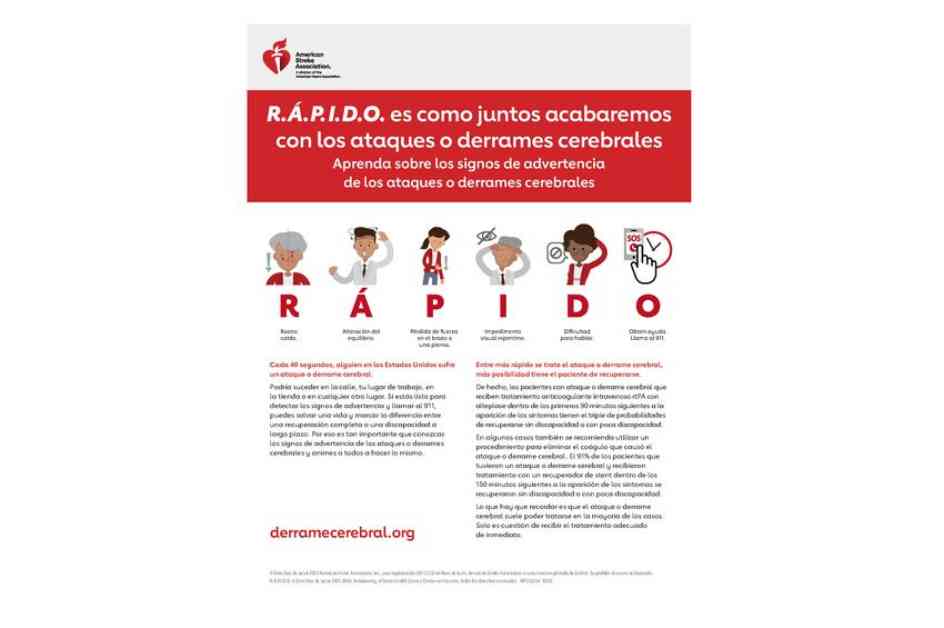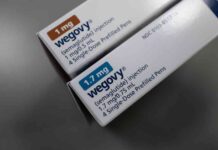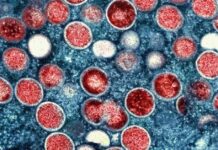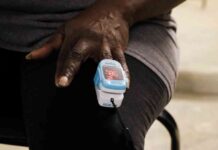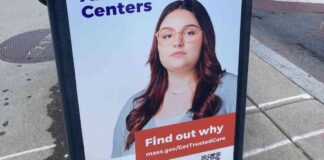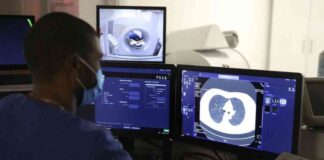Improving Inland Empire’s Health: American Heart Association & Cardenas Markets Foundation Collaboration
RIVERSIDE, Calif. – In a groundbreaking effort to address the critical need for stroke awareness and education in the Hispanic-Latino community in the Inland Empire, the American Stroke Association, a division of the American Heart Association, has partnered with the Cardenas Markets Foundation to launch the R.Á.P.I.D.O. campaign. This innovative initiative aims to bridge the gap between knowledge and action when it comes to recognizing and responding to stroke warning signs.
Stroke is a medical emergency that requires immediate attention, as every second counts in determining the outcome for the individual affected. Unfortunately, research has shown that Hispanic-Latino consumers have a lower level of familiarity with stroke warning signs compared to other demographics. Only 39% of Hispanic-Latino consumers were familiar with the F.A.S.T. acronym, and just 42% could correctly name two stroke warning signs without assistance.
To address this disparity, the R.Á.P.I.D.O. campaign was developed as a culturally relevant Spanish-language initiative to increase awareness of stroke warning signs among Spanish-dominant audiences in the Inland Empire. The acronym R.Á.P.I.D.O. stands for: R – Rostro caído (Face drooping), Á – Alteración del equilibrio (Loss of Balance), P – Pérdida de fuerza en el brazo (Arm weakness), I – Impedimento visual repentino (Sudden vision difficulty), D – Dificultad para hablar (Slurred or Strange Speech), and O – Obtén ayuda, llama al 911 (Get help, call 911).
The Cardenas Markets Foundation will play a crucial role in educating shoppers about R.Á.P.I.D.O. through various channels, including in-store education, accessible resources, community engagement, and internal messaging to employees. Marisa Kutansky, Senior Communications Director for Heritage Grocers Group, emphasized the importance of the partnership, stating, “R.Á.P.I.D.O. is a tool that can help save lives. We are committed to raising awareness of common stroke symptoms in collaboration with the American Heart Association.”
The Hispanic-Latino community in the U.S. faces a higher risk of stroke due to various factors such as unmanaged risk factors, limited access to healthcare, lower health literacy rates, cultural barriers, and socioeconomic determinants of health. Studies have shown that Hispanic-Latino stroke patients experience longer delays in hospital arrival, greater stroke severity, and poorer outcomes following a stroke. The R.Á.P.I.D.O. campaign aims to address these disparities and improve stroke outcomes within the Hispanic-Latino community.
The R.Á.P.I.D.O. campaign is set to kick off in September, coinciding with Hispanic Heritage Month. By empowering the Hispanic-Latino community to learn the stroke warning signs and take prompt action using the R.Á.P.I.D.O. acronym, the Association and Cardenas Markets Foundation hope to make a significant impact on reducing the prevalence of stroke among Hispanic men by 2030.
Dr. Pranav M. Patel, Chief of the Division of Cardiology at UC Irvine and President of the American Heart Association Inland Empire/Orange County Board, highlighted the importance of recognizing stroke symptoms quickly for timely treatment. He stated, “The R.Á.P.I.D.O. campaign serves as a critical tool to remind individuals to act fast when experiencing stroke symptoms, as prompt recognition and treatment are key to improving outcomes.”
In addition to the development of the R.Á.P.I.D.O. acronym, the campaign includes a multifaceted approach to raise awareness about stroke prevention within the Hispanic-Latino community. This includes the creation of a catchy jingle to help people memorize the acronym, as well as social and digital assets tailored to resonate with bilingual and Spanish-speaking individuals.
The ultimate goal of the R.Á.P.I.D.O. campaign is to increase knowledge of stroke signs, symptoms, immediate management, and modifiable risk factors within the Hispanic-Latino community. By leveraging the cultural relevance of R.Á.P.I.D.O. and promoting awareness about stroke prevention, the Association aims to reduce stroke disparities and work towards achieving health equity for all individuals.
In conclusion, the collaboration between the American Stroke Association, the American Heart Association, and the Cardenas Markets Foundation represents a significant step towards improving the health outcomes of the Hispanic-Latino community in the Inland Empire. By empowering individuals with the knowledge and tools to recognize and respond to stroke warning signs, the R.Á.P.I.D.O. campaign has the potential to save lives and make a lasting impact on the health and well-being of the community.
For more information about the R.Á.P.I.D.O. campaign and stroke awareness, visit www.stroke.org/rapido. Join the movement to prevent and treat stroke, and together, let’s build a healthier future for all.
